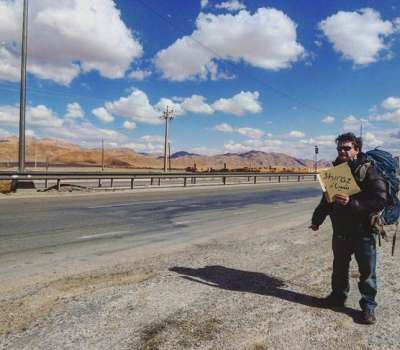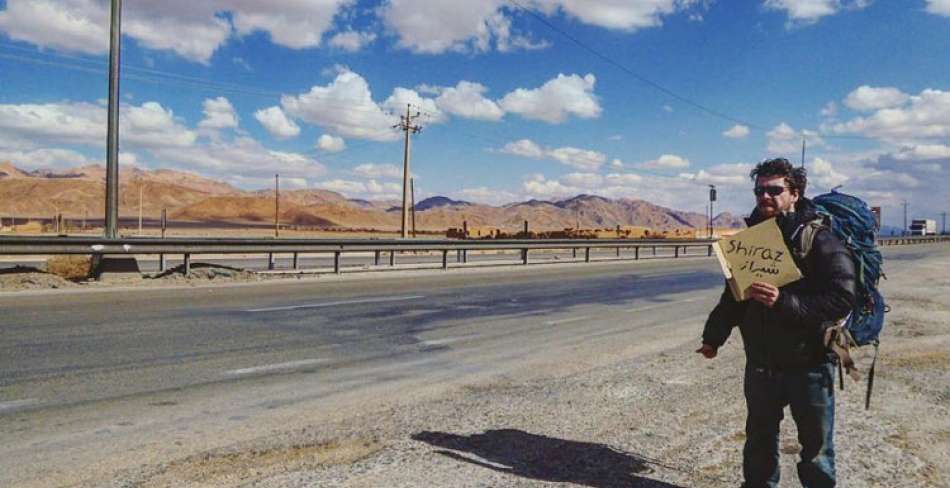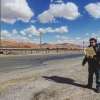

Here you can read all the information you need for backpacking in Iran based on tourist experiences who traveled through the country.
Iran which is the second largest country in the Middle East with an eventful history has been the home to one of the world's oldest civilizations. You can find high mountains, green forests and the coast of the Caspian Sea in the north, the Persian Gulf in the south, historical buildings from the Persian Empire era, majestic palaces and monumental mosques in the center of the country.
.jpg)
The Weather in Each Season
Summers are fairly cool in the mountains and the north, it is hot and dry in the center at the same time with temperatures even above 40°C! In general, you should focus on the spring and fall season for travelling. The extreme temperatures happen in summer and winter.
.jpg)
The Best Time to Travel to Iran for Backpacking
April to June as well as September to November are the best time for backpacking in Iran. When planning your trip, check national holidays as well as the time of Ramadan to avoid restrictions. Try to avoid the time around Nowruz (Iranian New Year) that starts in 20 /21st of March for two weeks, when it is usually impossible to book accommodations.
.jpg)
Visa
The procedure is different depending on your nationality and your travel style, moreover; you should check the regulations for Iran visa a few months before traveling to avoid any problem. To Read about Iran Visa completely, click on the link.
.jpg)
Travel Insurance for Backpackers
Get a travel insurance that covers Iran. One of the first requirements to obtainyour desired travel dates (you need to bring a print of your travel insurance a visa is a proof of a travel insurance that covers you in Iran for confirmation).
.jpg)
Entry Requirements for Backpackers
Normally, you need visa to enter the country if you are from US, UK, Canada and 10 other countries but citizens of 8 countries e.g. Turkey can enter Iran without visa. Recently, entering the country has become easy with the option of Visa on Arrival for most travelers on all major airports.
Language
Persian is the language spoken in Iran. If you want to speak English or you need a help, you can ask young people or guides. The language barrier maybe one of the challenges you'll face backpacking in Iran but you can make up for that by using hand gestures. However, we prepare some necessary persian travel phrases, click on the link to get them.
Local Law
Iran is an Islamic republic country– this means that the Islamic law applies and is enforced partially very strictly.
Important Rules of Conduct for Travelers
Tourists need to be aware of the local laws and need to follow them; otherwise, you can face strict punishments:
1. Drinking alcohol, taking drugs and homosexuality are strictly forbidden;
2. Women have to follow the Islamic dress codes;
3. Physical contact between opposite sexes are not accepted;
4. Sexual relations between unmarried couples are considered illegal;
5. Dancing in public is forbidden;
6. Eating and drinking in public during Ramadan are not allowed due to Islamic laws;
7. Blowing your nose in public is a taboo;
8. Avoid photographing or filming public and military buildings at all costs;
9. Avoid political and/or religious or other controversial discussions;
10. Friday in Iran is the holiday and Thursday and Friday are officially weekends.
Dress code
A chador isn't necessary except in some mosques where you can borrow them for the time of your visit. Generally, women need to cover their head and wear loose clothes covering all the body expect hands and feet. Men should dress appropriately, preferably long shirts and long pants. Whereas T-Shirts are widely accepted, shorts are not very common, even when it is boiling hot. click on the linke to know all about dress code or hijab in Iran.
.jpg)
Money
The local currency in Iran is Rial; however, Toman is another currency widely used by locals. Each Toman equals 10 Rials.
.jpg)
Exchange Office or Bank?
The exchange is done in some Iranian banks and exchange offices. Ask for recommendable exchange offices in your hotel /hostels where you can change your money safely. Avoid changing money on the street! Click on the link to get all you need to know about costs in Iran, exchanging money and all connected things.
.jpg)
Iran Transport
There are many regular flight connections with established international airlines – especially between destinations in Europe and Iran. Istanbul and Dubai are the major hubs for flights to Iran but the national airlines such as Iran Air and Mahan Air are expanding their network constantly.
.jpg)
Domestic Flights in Iran
If you are short of time you should consider this option to cover long distances. You can book easily via a travel agency in Iran. Some hotels also provide flight bookings.
.jpg)
Intercity Buses
The bus is the most uncomplicated and common way of covering almost all the roads in Iran as you can purchase tickets even shortly before departure at the bus terminals. Make sure to book the VIP Bus for longer distances, these offer more comfort with very wide armchairs, more legroom, air conditioning and snacks.
.jpg)
Trains
It is highly recommended to take the night train for the route between Tehran and Yazd or vice versa in order to save time and money for a hotel. To book your ticket, you also need to contact a travel agency in Iran or ask your hotel for assistance.
.jpg)
Taxis
The cab is usually the best and easiest way to get around in the cities. It is wise to consult locals before your ride to know the normal price of your route and fix a price with the cab driver before you get in.
.jpg)
Metro
In Tehran, Mashhad, and Shiraz, using the metro is the fastest and cheapest way to get around due to the heavy traffic in theses metropolitan cities. Men and women usually have different wagons.
.jpg)
Inside-city Buses
the cheapest way to travel around the cities and towns is taking a bus. Although they are not fast, they are suitable for visiting different places around the city.
.jpg)
Accommodation in Iran for Backpackers
For booking your accommodation ahead of time, you can ask a travel agency to reserve an accommodation suitable with the money you wish to pay. However, there are some websites where you can easily book your hotel, hostel, etc. When booking a hostel, have this point in mind that some hostels have shared bathrooms and toilets.
Hostels:
The concept of hostels is rather new to the country but you can find some good options in the popular destinations such as Isfahan and Yazd. If you need more information about hostels in Yazd click on the link.
.jpg)
Hotels:
It is the most common accommodation option for tourists which are divided in two types: modern hotels and traditional hotels. It must be mentioned that traditional hotels are located in traditional buildings and they are usually equipped with modern facilities. To read about hotels in Yazd or book them click on the link.
.jpg)
Ecolodges and Traditional Houses
This kind of accommodation is the most appropriate type for back packing as you can save good money beside receiving rather good service and experiencing local atmosphere. Click on the link to experience a local stay in Yazd traditional houses and ecolodges.
Safety in Iran
Generally, Iran is a very safe country to travel and most likely the safest country in the whole region.
Health in Iran
As stated above, you need a health insurance that covers Iran to enter the country and cover you in the case anything happens throughout your trip. The medical care services in Iran is very decent in the Tehran, Isfahan, Mashhad, Shiraz and Yazd.












.jpg)
.jpg)
.jpg)
.jpg)
.jpg)
.jpg)
.jpg)
.jpg)
.jpg)
.jpg)
.jpg)
.jpg)
.jpg)
.jpg)
.jpg)
.jpg)
.jpg)

